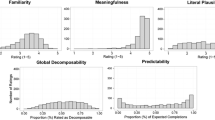Abstract
The relationship between idiom familiarity and idiom comprehension was investigated. Familiar and less familiar idioms were presented in three types of sentences. The sentences were biased toward the idiom's literal meaning, biased toward the idiom's idiomatic meaning, or unbiased toward either meaning. Reading times for sentences containing less familiar idioms were longer than for sentences containing familiar idioms, but there was no significant main effect for sentence type. The familiarity by sentence type interaction was significant. In literal sentences, less familiar idioms required more reading time than familiar idioms. In idiomatic sentences, less familiar idioms required more reading time than familiar idioms. The results are interpreted as being consistent with the idiomatic processing model, which proposes that processing of an idiom's idiomatic meaning precedes processing of its literal meaning.
Similar content being viewed by others
References
Boatner, M. T. (Ed.).A dictionary of idioms for the deaf. Woodbury, New York: Barron's Educational Series.
Bobrow, S., & Bell, S. (1973). On catching on to idiomatic expressions.Memory and Cognition, 1, 343–346.
Cicchetti, D. U. (1972). Extension of multiple-range tests to interaction tables in analysis of variance: A rapid approximate solution.Psychological Bulletin, 77, 405–408.
Estill, R. B., & Kemper, S. (1982). Interpreting idioms.Journal of Psycholinguistic Research, 11, 559–568.
Gibbs, R. W. (1980). Spilling the beans on understanding and memory for idioms in conversation.Memory and Cognition, 8, 149–156.
Glass, A. L. (1983). The comprehension of idioms.Journal of Psycholinguistic Research, 12, 429–442.
Ortony, A., Schallert, D. L., Reynolds, R. E., & Antos, S. J. (1978). Interpreting metaphors and idioms: Some effects of context on comprehension.Journal of Verbal Learning and Verbal Behavior, 17, 465–477.
Swinney, D. A., & Cutler, A. (1979). The access and processing of idiomatic expressions.Journal of Verbal Learning and Verbal Behavior, 18, 523–534.
Author information
Authors and Affiliations
Additional information
I would like to thank Dr. Danny Moates, Dr. Gary Schumacher, Dr. George Klare, Don Penzien, Karl Hursey, and Caryn Christensen for their helpful comments on a previous draft of this manuscript. I also gratefully acknowledge Tom Bentevegna, Mickala Catalona, Connie Newton, Dana Ritter, and Jay See for their assistance in materials preparation and data collection, and Garaung Choksi for developing the computer program.
Rights and permissions
About this article
Cite this article
Schweigert, W.A. The comprehension of familiar and less familiar idioms. J Psycholinguist Res 15, 33–45 (1986). https://doi.org/10.1007/BF01067390
Accepted:
Issue Date:
DOI: https://doi.org/10.1007/BF01067390



